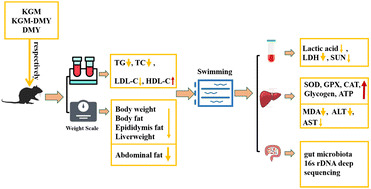The synergic effects and mechanism of KGM–DMY complex in the prevention of obesity and enhancement of fatigue resistance in mice†
Abstract
Dietary fibers (DFs) are normally consumed together with polyphenols. Further, both of them are two kinds of popular functional ingredients. However, studies have shown that the soluble DFs and polyphenols are antagonistic to their bioactivity due to the potential loss of the physical properties that drive their benefits. In this study, konjac glucomannan (KGM), dihydromyricetin (DMY), and KGM–DMY complex were fed to mice on normal chow diet (NCD) and high fat diet (HFD). The body fat content, serum lipid metabolites and time to exhaustion in swimming were compared. It was found that KGM–DMY had synergistic effects on the reduction of serum triglyceride, total glycerol content in HFD-fed mice, and extension of time to exhaustion in swimming in NCD-fed mice. The underlying mechanism was explored by antioxidant enzyme activity measurement, energy production quantification, and gut microbiota 16S rDNA profiling. KGM–DMY synergistically reduced the lactate dehydrogenase activity, malondialdehyde production, and alanine aminotransferase activities after swimming. Moreover, superoxide dismutase activities, glutathione peroxidase activities, glycogen and adenosine triphosphate contents were synergistically enhanced by KGM–DMY complex. In addition, according to gut microbiota gene expression analyses, KGM–DMY enhanced the ratio of Bacteroidota/Firmicutes and the abundance of Oscillospiraceae and Romboutsia. The abundance of Desulfobacterota was also reduced. To our knowledge, this was the first experiment that indicated that the complex of polyphenols and DF have synergistic effects in obesity prevention and fatigue resistance. The study provided a perspective for the formulation of obese preventive nutritional supplement in the food industry.



 Please wait while we load your content...
Please wait while we load your content...